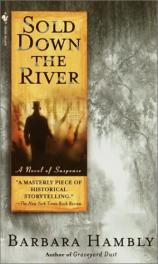Sold Down the River
Review
Sold Down the River
I'm going to have to 'fess up, here. I am quite simply in awe of
Barbara Hambly. She has created works in any number of genres ---
science fiction, fantasy, mystery, and horror --- with equal
aplomb, creating in the process worlds so real that they threaten
to displace this one.
Now, I happen to believe that it is much more difficult to write a
historical novel than it is to create a universe out of whole
cloth. With the latter, you can make it up and change things as you
go along, stick the square pegs in the round holes, and as long as
you paint it and sand it down in the end so that it is all nice and
neat, no one will be the wiser that your first draft was so full of
contradictions that you had to write it over three or four times.
But historical fiction... You're dealing with a well-examined
template and you can't really change the rules. You've got to do
your research and stay true to your topic and to the events. You're
putting characters who never existed into places and situations
that did. If you're going to carry it off, you better have your
research done correctly and have a cast of characters who are not
only interesting but also believable, interacting in a story that
will keep your audience engrossed whether they are familiar with
the setting or not. And if you are doing it in the context of a
series, you have to be able to backtrack and explain what has gone
before well enough that readers who have been with you from the
beginning will not be bored but provide enough background so that
new readers can climb aboard. Absolutely no one combines these
elements better than Barbara Hambly does. And no set of books
illustrates this ability better than her Benjamin January
novels.
Benjamin January is a Free Man of Color in New Orleans in the
1830s, a surgeon by education, a musician by profession, a
conflicted and complicated man of faith and morals who tries to do
the good and right thing in a time and place that mitigated against
such an attitude. SOLD DOWN THE RIVER, the fourth of the Benjamin
January novels (after A FREE MAN OF COLOR, FEVER SEASON, and
GRAVEYARD DUST) begins with January's past as a slave coming back
to haunt him when he finds Simon Fourchet, his former master, in
his mother's parlor. Fourchet, as cruel a slavemaster as ever
existed, requires Benjamin's assistance. Someone is attempting to
destroy Fourchet's plantation and Fourchet in the process. His mill
has been set afire, his butler murdered, and his field hands
poisoned --- and voodoo cursemarks are appearing everywhere.
Fourchet wants Ben to go undercover on the plantation as a slave,
and spy, to discover who is responsible. Initially, not even the
promise of money, which Ben so desperately needs, is enough to
persuade him to aid the man he hates perhaps more than anyone
living. It is only the realization that there will be dire
consequences for all of the slaves if the responsible party is not
apprehended that persuades Benjamin to reluctantly agree to aid
Fourchet.
Benjamin soon finds himself immersed in a life and a horror that he
had left behind long ago. And while he is appalled at the
conditions under which the slaves reside, he slowly comes to
realize how truly fortunate he was that his mother was purchased,
then freed, and that the same was done for him. For whatever
difficulties he experiences as a free person in New Orleans are
nothing as compared to the tribulations of a slave. Ben soon finds
that solving the mysteries of Fourchet's plantation may be
relegated to second place as he uses every bit of his energy and
intelligence to simply survive in a hostile environment and era.
And what of the biggest mystery of all? What became of Benjamin's
father, the strong but gentle man that Benjamin remembers only in
fits and snatches?
SOLD DOWN THE RIVER is labeled as a novel of suspense. It is that;
it succeeds, however, on so many levels and across so many genres
--- as a mystery, as a historical novel, as a romance --- that to
classify it under any one of these would do it an injustice. It is
nothing less than a major work of fiction. Highest possible
recommendation.
Reviewed by Joe Hartlaub on January 23, 2011





